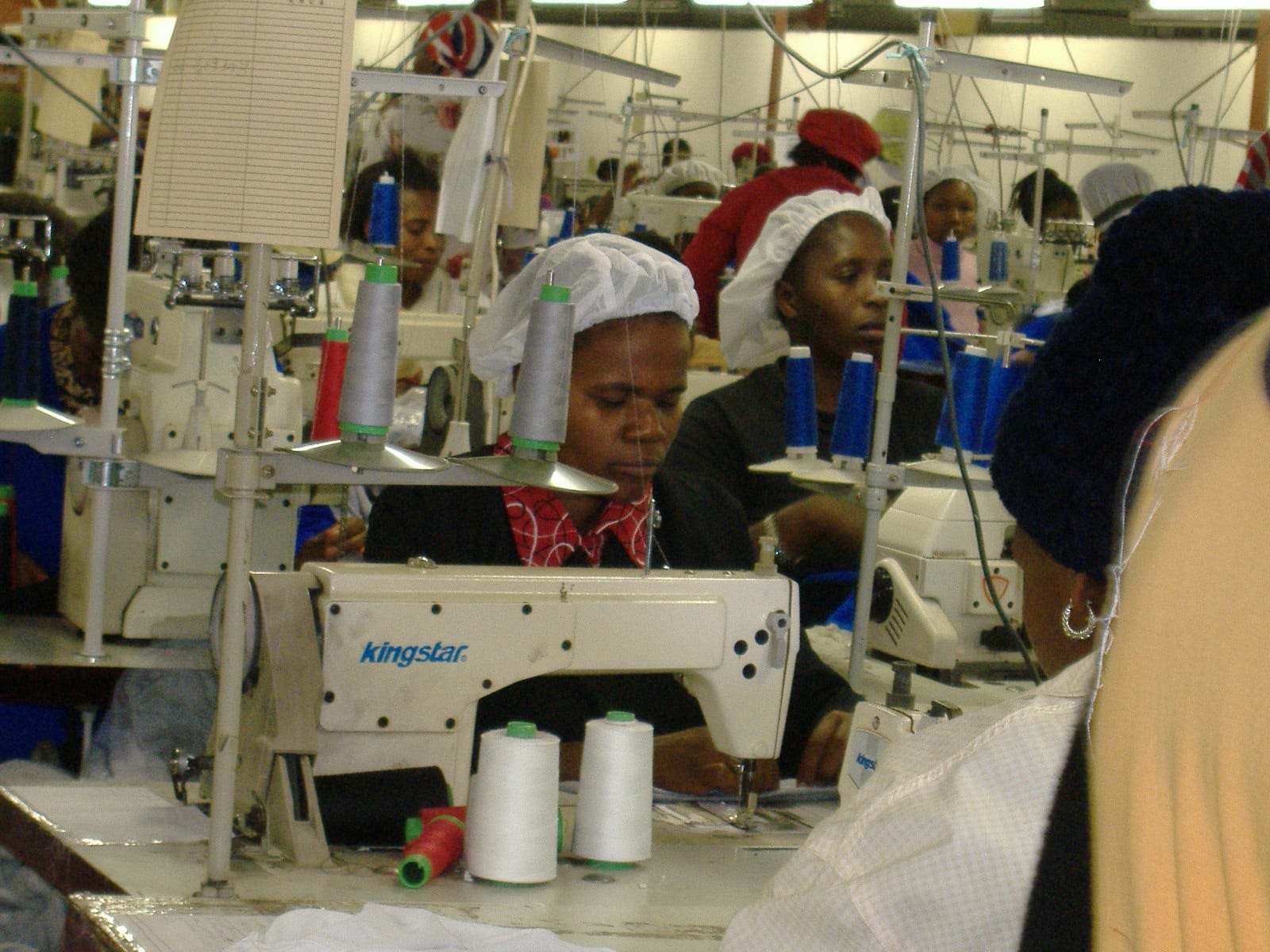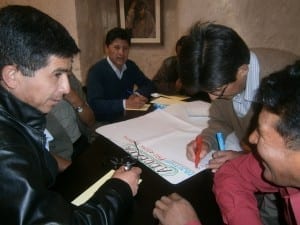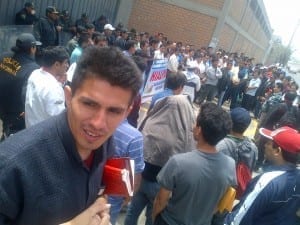Aug 5, 2014
African trade union leaders from across the continent called on U.S. and African leaders to adopt a decent work agenda for trade and economic growth where the creation of good jobs that respect worker rights and provide social protections will lead to greater shared prosperity.
Union leaders discussed issues regarding jobs, development and investment at an official U.S.-Africa Leaders’ Summit workshop yesterday: “Promoting Decent Work: Priorities for U.S. and African Leaders, Civil Society and Private-Sector Shareholders.” Their recommendations, which include a focus on gender equality, will be submitted to the African heads of state also meeting this week in Washington, D.C.
The panel discussion highlighted the reality that although many countries in sub-Saharan Africa are seeing tremendous economic growth through oil and mineral exports, the emergence of a textile sector and expanding foreign investment, workers and their families are not sharing in the prosperity. Indeed, in many sub-Saharan African countries, the majority of workers toil in the informal economy, leaving them vulnerable to economic shocks, without social protections and with limited ability to transition into formal employment—and often trapped in a multigenerational cycle of poverty.
Sahra Ryklief, secretary general of the International Federation of Workers’ Education Associations (South Africa), said: “Why do we promote decent work? Because if we don’t, we are headed for disaster. For a worker who does not have a steady income, life is precarious. And Africa has 80 percent of the population in informal work–many of them women. So many that they have come to be known as the ‘precariat.’”
To combat this problem and the gross inequality that it engenders, Kwasi Adu-Amankwah, Secretary General of the International Trade Union Confederation-Africa called for focused strategies that industrialize national economies and create better, formal-sector jobs. Formal livelihoods that provide real wages and a decent standard of living, he argued, are key to lifting up the working poor. In addition, the wealth generated through high levels of economic growth over the past decade should be reinvested in the African people via strong social institutions and investment in working women and men, through effective skills training programs.
Speakers also stressed the importance of extending social protections and worker rights to the majority of African workers in informal employment, to improve livelihoods and provide them equal protection under the law.
The workshop featured:
• Christopher Lu, U.S. deputy secretary of labor;
• Steven Feldstein, deputy assistant secretary of state, U.S. Department of State Bureau of Democracy, Human Rights and Labor;
• Kwasi Adu-Amankwah, general secretary, International Trade Union Confederation-Africa;
• Eric Biehl, associate deputy undersecretary for international affairs, U.S. Department of Labor, International Labor Affairs Bureau;
• Sahra Ryklief, secretary general, International Federation of Workers’ Education Associations; and
• Sabina Dewan, president and executive director, Just Jobs Network.
A set of recommendations will be publicly available soon.

Jul 30, 2014
A recent survey by the Trade Union Congress of Swaziland (TUCOSWA) of more than 400 textile workers in Manzini, Swaziland, reveals that workers in the textile sector are subject to harsh and sometimes abusive conditions, many of the country’s labor laws are routinely violated by employers, and union activists are targeted by employers for punishment. (Download a PDF of this article.)
Surveys were collected by a team of five TUCOSWA union organizers from June 23–July 2, 2014. Workers from 18 of 28 textile companies in Manzini were represented in the survey and included sewing machine operators, pressers, quality controllers, packers, cleaners, trimmers, cutters and storeroom workers. The vast majority of respondents—94 percent—were women. And nearly a third of workers surveyed had post-secondary school education.
Notably, 91 percent of workers surveyed reported being punished by management for making errors, not meeting quotas or missing shifts. “I was a victim of physical abuse,” said one survey respondent. She is not alone. More than 70 percent of survey respondents reported witnessing verbal and physical abuse in their workplace by supervisors.
Some workers reported that supervisors slap or hit workers with impunity. In one example, a worker knocked to the ground by a line manager was suspended during an investigation of the incident while the line manager continued in her job.
Women reported instances of sexual harassment, as well. Several workers said they or other contract (temporary) workers were offered a permanent job in exchange for sex.
Nearly all workers—90 percent—reported having production quotas. Of these, more than 30 percent said they can never, or almost never, meet their quota, while more than 80 percent reported difficulty meeting their quota. According to the survey, punishments for not meeting quotas include suspension without pay, mandatory unpaid work through lunch breaks and verbal harassment.
Survey results also show that employer punishment of workers who are ill, injured or pregnant is common. More than 60 percent of workers said they knew someone who was fired for being sick or pregnant. Some respondents said any worker taking five sick days are automatically punished with three months forced unpaid leave.
The Swaziland Employment Act of 1980 guarantees maternity leave, prohibits termination for pregnancy and mandates 14 days paid sick leave per year under penalty to the employer of a fine or up to one year imprisonment.
Even though more than ninety percent of survey respondents believe a union would help them improve workplace conditions, survey responses show that most employers in the textile sector are hostile to unions. Eighty percent of respondents said their employer does not accept workers’ right to form a union while almost the same number reported knowing of union organizers, activists or leaders who were punished, fired or otherwise intimidated.
“Union members are victimized so I am scared to join,” said one worker.
Workers report that more than half of the clothing they produce is destined for U.S. and European stores.
In June 2014, Swaziland lost eligibility for benefits under the Africa Growth and Opportunity Act (AGOA) because the Swazi government had not demonstrated progress on the protection of internationally recognized worker rights, in particular, protecting freedom of association and the right to organize. The U.S. government, in announcing the rescinding of AGOA eligibility, also pointed out Swaziland’s “lack of legal recognition for labor and employer federations.”
TUCOSWA was formed in in January 2012 and registered by the Swazi government. The union federation was deregistered in April 2013, putting the government in violation of Convention 87 of the International Labor Organization Convention 87 which the government has ratified. Since deregistration intimidation of TUCOSWA leaders by government security forces has been widely reported, including arbitrary arrests, threats and assaults while in police custody.
.jpg) |
Safety Concerns @ Work:
Safety concerns: dust (causing respiratory problems), hot pipes, steam (causing burns), needle sticks, falling equipment and/or production materials.
Awareness:
Percent of workers who have seen other workers injured at work. |
.jpg) |
Aware of Union Intimidation:
Aware of union organizers, leaders, activists being punished, fired or otherwise intimidated. |
.jpg) |
Allowed Breaks:
No breaks during the day. Restroom breaks tightly controlled.Abused:
Verbal and physical abuse by supervisors.Job Loss due to Sickness or Pregnancy:
Workers who know of someone being fired for getting sick or pregnant. |
Feb 14, 2014

Textile workers at a meeting in Arequipa, where union leader López was fired after a successful contract campaign. Credit: Milko Sotomayor
José López Mota, former leader of a textile workers’ union local in Peru and current general secretary of the regional textile federation FERRETEX, was fired on February 10, 2014. He was dismissed after the union achieved a collective bargaining agreement in late 2013 for allegedly missing more than 15 days of work without permission. However, López was conducting union business during those days, using legally mandated union leave.
López led a highly visible campaign at the garment and yarn manufacturing factory where he worked, calling for management to negotiate a fair collective bargaining agreement. The union’s peaceful work stoppages that followed more than six months of labor-management negotiations were ultimately successful in gaining workers a collective bargaining agreement.
“They want a leader who does not speak up. I fought for union rights and alongside my brothers and sisters, we achieved two significant improvements in the two years that I was in charge,” López told Peruvian newspaper La República.
Last month, the union held elections in which López was replaced as general secretary. Although he continues to serve as the general secretary of the regional textile federation, he no longer is protected by “union immunity” (fuero sindical) extended to workplace union leaders.
The factory management says López took days off without permission. During that time, López used his protected right to take union leave to help conduct contract negotiations and attend labor conciliation meetings with company participation at the Arequipa regional labor directorate. But because he did not always ask for days off in writing, he has no paper trail to prove he was absent for legitimate union work.
“These methods (of repression) that were common practice in the past no longer generate the effect desired by employers who continue in this retrograde mentality,” said Geronimo López, Arequipa Region secretary-general of the Confederación General de Trabajadores del Perú (CGTP). The CGTP is one of Peru’s four main union federations. “On the contrary, to confront these anti-union actions, workers understand that they need to strengthen their unity and act with even greater commitment to defend their rights.”
Peruvian labor federations and international organizations are concerned about this violation of International Labor Organization (ILO) Conventions 87 and 98 (freedom of association and freedom to form a union and collectively bargain), and the intimidation tactics used to silence a labor rights defender in Arequipa’s booming textile and apparel sector.
Jan 7, 2014

Credit: Congress of Haitain Workers
Four years ago this weekend, a massive earthquake brought catastrophe to the lives and livelihoods of tens of thousands of Haitians. Despite an outpouring of promises and millions of dollars in investment designated to help workers get back on their feet, the majority of Haitians still live in poverty. Instead of supporting recovery, their meager incomes fund little more than continued privation.
Formal jobs, particularly those in the export sector, were presented as the panacea to Haiti’s economic woes and key to helping Haitian men and women move forward. Yet four years after the January 12 quake, the country has five minimum wages, divided by sector—none of them enough to cover basic expenses, said Molly McCoy, Americas regional program director for the Solidarity Center. “These should be good jobs, but workers are telling us that no one is getting by.”
The Collective of Textile Factory Unions Organization (KOSIT), an alliance of four Solidarity Center partner unions in the garment sector, is calling for a minimum wage that will enable workers to meet their basic needs.
Workers with export-related jobs such as garment assembly, a sector that largely employs women, say they often take home lower than the minimum wage because it is tied to complicated and unreachable quotas. And recent studies point to factories cheating workers out of earned wages, exacerbating the struggle to earn a decent living. Meanwhile, prices in the island nation, a net importer of food and fuel, continue to rise.
As the Solidarity Center reported in 2011 and continues to hear from workers in the capital, Port-au-Prince, workers cannot earn enough to feed and shelter their family, cover transportation to work and send their children to school.
“Haiti needs a single minimum wage that all workers are able to earn—one that people can actually live on,” said McCoy. “Exploitive jobs that mire working people in subsistence lives is the wrong combination for recovery, much less for building Haiti back better.”
Nov 6, 2013

Amed Huber, secretary of Legal Affairs at the Topy Top union, joined a rally in support of Hialpesa textile factory workers. Credit: Gerardo Olortegui, National Federation of Peruvian Textile and Apparel Workers
Peruvian textile workers are standing firm in their demands that a textile company obey a recent Labor Ministry ruling requiring the company to transition workers to permanent job contracts.
Since November 1, members of the Hialpesa Workers’ Union have been reporting to work without signing fixed (short-term) contracts. The Hialpesa textile factory is refusing to allow workers who have not signed a new contract back to their jobs.
In September, Peru’s Ministry of Labor ruled that all 1,008 workers at the Hialpesa textile factory in Lima be transitioned to indefinite term (permanent) contracts that would guarantee job security. Despite the Ministry’s ruling, Hialpesa has conditioned employment by offering workers only fixed-term contracts.
Peru’s complicated export laws have led to the abuse of short-term contracting, which not only severely restricts worker rights but also discourages workers from reporting workplace violations and exercising their rights because they fear their contracts will not be renewed. Although numerous short-term contracts have been renewed over the years, the lack of employment guarantees means workers are unable to plan for the future and adds to their economic vulnerability.
“The union is standing firm and we’re not going to sign any more short-term contracts or deals that fall short of full recognition of our rights,” said Pedro Broncales, general secretary of the Hialpesa Workers’ Union. “The Labor Ministry has issued its resolution. Now it’s time for Hialpesa to respect it.”
The Hialpesa workers’ demands are both legal and with precedent—in September 2013, another Solidarity Center partner, the Union of Workers at Franky and Ricky apparel factory in Arequipa, campaigned successfully for its employer to move 300 workers who were on short-term contracts onto permanent contracts. The Solidarity Center has partnered with members of the Franky and Ricky union on trade union capacity building and labor rights enforcement campaigns since 2011. As a result, the largely female apparel workers now have more employment stability.
Jyrki Raina, general secretary of the global union federation IndustriALL, is urging the ministry to enforce its decision.
Earlier this year, six international apparel companies threw their support behind repeal of a law in Peru that allows employers in the garment and textile export industries to hire workers on consecutive short-term employment contracts.


.jpg)
.jpg)
.jpg)
.jpg)


